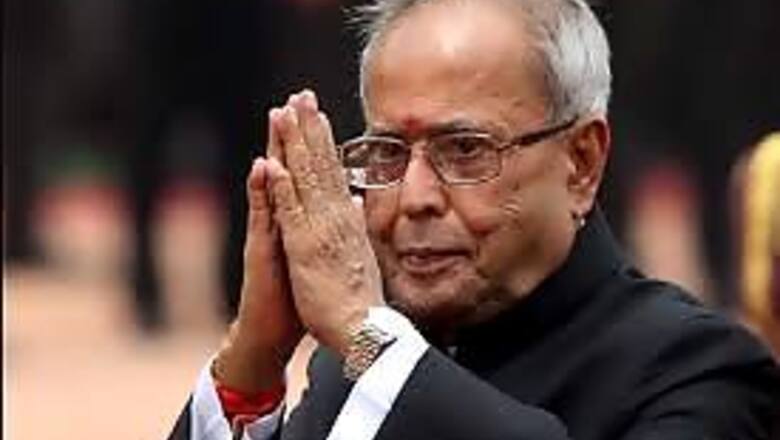
views
President Pranab Mukherjee on Friday signed the ordinance on Food Security to give nation's two-third population the right to get 5 kgs of foodgrains every month at highly subsidised rates of Rs 1-3 per kg. Mukherjee cleared the ordinance, which was received by the President's Secretariat on Thursday night, ending speculation that he may not be in a rush to give his nod in the wake of strong reservations over its present form expressed by BJP, Left and some other major parties.
The Food Security programme will be the biggest in the world with the government spending estimated at Rs 125,000 crore annually on supply of about 62 million tonnes of rice, wheat and coarse cereals to 67 per cent of the population. The Cabinet, which had last month deferred a decision on the issue following differences within, had approved promulgation of an ordinance to implement the Food Security Bill on Wednesday.
The Ordinance comes just weeks before the scheduled Monsoon session of Parliament and political parties demanding that the Food Security Bill be debated in both Houses before being passed. Left parties attacked the government for taking the ordinance route saying the UPA-II has shown contempt for Parliament while BJP termed it an "election gimmick" saying Congress was running away from a debate in the House.
Samajwadi Party, a key outside supporter of UPA, also sharply opposed promulgation of the ordinance saying it was undemocratic and the programme would derail the food economy. The Ordinance will have to be approved by both the Lok Sabha and the Rajya Sabha within six months of promulgation. The measure will guarantee 5 kg of rice, wheat and coarse cereals per month per person at a fixed price of Rs 3, 2, 1, respectively. However, about 2.43 crore poorest of the poor families covered under the Antyodaya Anna Yojana (AAY) scheme under PDS (Public Distribution System) would continue to get 35 kg of foodgrains per family per month but with legal entitlement.
"The President of India Shri Pranab Mukherjee promulgated the National Food Security Ordinance, 2013 today," Rashtrapati Bhavan spokesperson Venu Rajamony said in a statement. The scheme will take at least six months to cover the entire country, officials said. The ordinance seeks to confer the right to food to a larger section of population, ensure allocation of sufficient foodgrains on regulator basis under PDS and enable state governments to handle unforeseen situation caused by drought and other natural calamities.
The government is believed to have opted for the ordinance route as some BJP-ruled states like Chattisgarh and Madhya Pradesh are already issuing foodgrains at Rs 1 per kg. The Commission for Agriculture Costs and Prices (CACP) Chairman Ashok Gulati feels that at present the ordinance can be a blessing in disguise as there is huge foodgrains stock with the government. But how far it will remain sustainable unless we fix PDS, stabilise production and invest in storage and transportation are issue that needs to be factored in, he said.
The biggest challenge is fixing leakage in PDS in states where poverty is more. The second biggest threat will be that higher procurement of foodgrains to meet food bill demand, will drive out private players from wheat and rice market, he said. In Lucknow, Samajwadi Party chief Mulayam Singh Yadav attacked the Congress over the ordinance, accusing it of indulging in vote bank politics and said its intentions were not good. As Lok Sabha elections are near, Congress is bringing the ordinance like it had brought rural employment scheme MNREGA before the previous polls, he said.
Hitting out at the Government, BJP said the "Ordinance route is absolutely unacceptable". Terming the Government step as "very objectionable", senior leader Yashwant Sinha warned that this would lead to confrontation in the Monsoon session of Parliament. Government should have convened a special session of Parliament and debated the Food Security measure, he said. Congress dismissed the Opposition contention that Government rushing with the ordinance gave indications of early Lok Sabha polls.
The food security measure is a game changer that will provide right to cheap food grains to 82 crore people, it said. Congress general secretary Ajay Maken and Food Minister KV Thomas accused the Opposition of blocking the passage of the key bill in the last session of Parliament. "This may be a life saver, life changer for many people...So delay even by a single minute or day, God knows how many lives it could cost," Maken, Communication Department Chief of the Congress said, justifying the ordinance. Under the Ordinance, the list of beneficiaries would be prepared by the state governments.
Other major highlights of the Food Security Ordinance are Rs 6,000 as maternity benefit and home ration or hot cooked food for children in the age group of 6 months to 14 years. The eldest woman will be Head of the household for issue of ration card. If not available, the eldest male member will then be the head of the household for these purposes.
The other provisions of the Ordinance include providing central funds to states in case of short supply of foodgrains in case of natural calamity. The Centre would also provide assistance to states towards cost of transportation, handling of foodgrains and FPS dealers' margin. The state and district level redressal mechanism will be set up to ensure transparency and accountability. A penalty will be imposed on public servants or authority, if found guilty of failing to comply with the relief recommended by the District Grievance Redressal Officer.
At present, Centre supplies 35 kg of foodgrains to BPL/AAY families and at least 15 kg to APL families. Wheat is supplied at Rs 2/kg for AAY, while BPL gets wheat at Rs 4.15/kg and APL at Rs 6.10/kg. Rice is given at Rs 3/kg to AAY, Rs 5.65/kg to BPL and Rs 8.30/kg to APL. There are currently 6.52 crore BPL familes, which include 2.43 crore AAY families. The number of APL families are 11.5 crore.




















Comments
0 comment